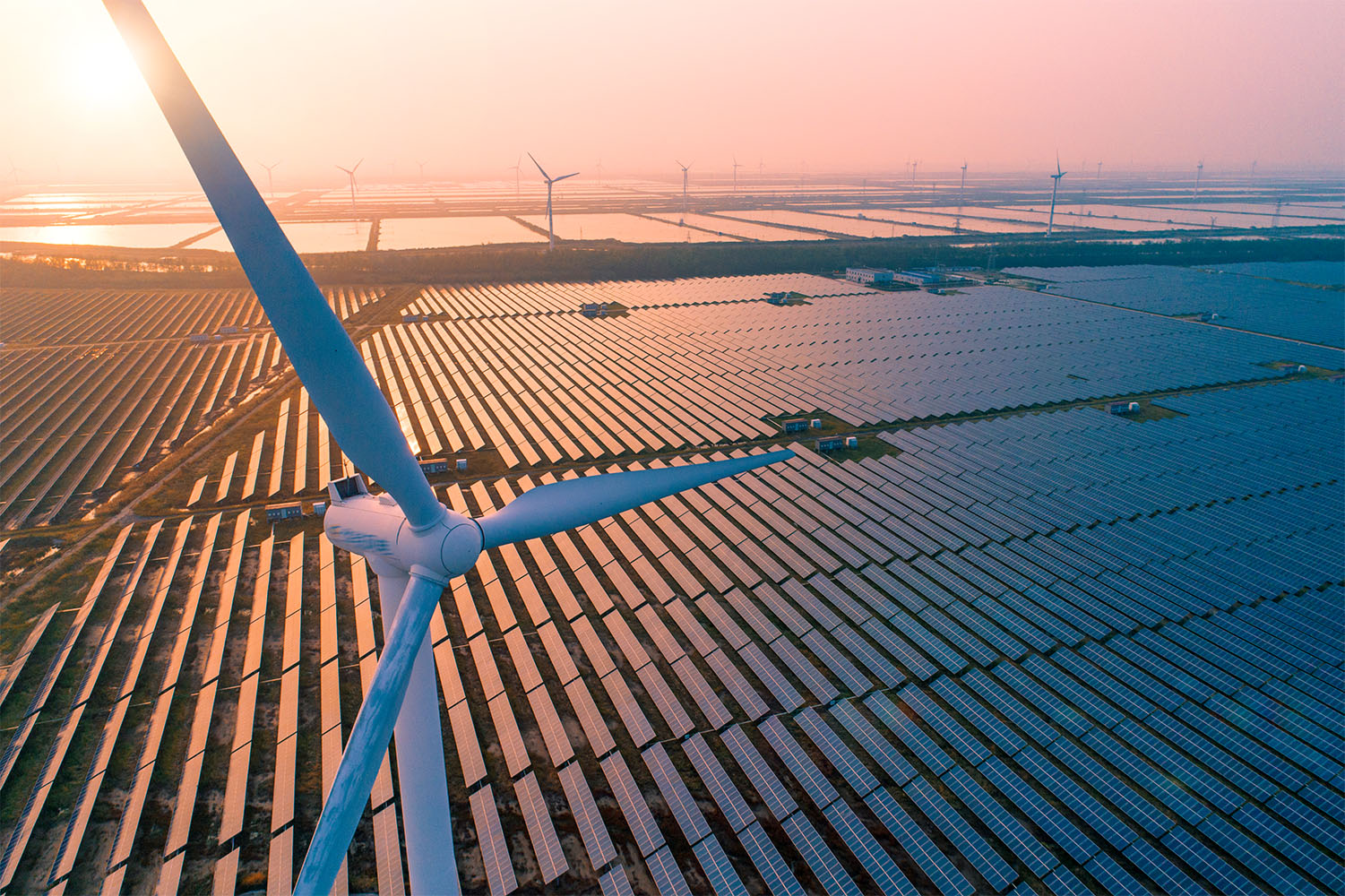Royal Decree-Law 8/2023 of 27 December: Urgent measures in the energy sector
Published on 2nd January 2024
Royal Decree-Law 8/2023 of 27 December includes a series of far-reaching measures aimed at the energy sector, in particular the extension of the administrative milestones that must be met in the development of electricity generation facilities.

On 27 December 2024, the Council of Ministers approved Royal Decree-law 8/2023, of 27 December, adopting measures to address the economic and social consequences of the conflicts in Ukraine and the Middle East, also to alleviate the effects of the drought (RDl 8/2023). This extensive regulation is in addition to the previous royal decree-laws that, in a total of seven -eight including the piece of legislation analysed here- have been successively approved with the aim of dealing with the consequences of the war in Ukraine.
As usual, RDl 8/2023 includes a heterogeneous package of measures affecting areas as diverse as finance, taxation, energy and transport, as well as measures of a social nature and others to alleviate the effects of the drought.
Throughout this note we will outline the main measures included in RDl 8/2023 dedicated to the energy sector.
I. Extension of the administrative milestones established in art. 1 of Royal Decree-law 23/2020, of 23 June 2020
1. Under the heading "Measures for the orderly incorporation of renewable energy production facilities in the electricity sector", RDL 8/2023 extends the deadlines for compliance with the fourth (obtaining the administrative authorisation for construction) and fifth (obtaining the definitive administrative authorisation for operation) milestones contained in article 1 of Royal Decree-Law 23/2020, of 23 June (RDL 23/2020). This extension of deadlines is applicable only to those facilities that have obtained access and connection permits between 31 December 2017 and 29 December 2023 (date of entry into force of RDL 8/2023).
a) The deadline for obtaining administrative authorisation for construction is extended to 49 months (6 months longer than the 43 months stipulated in Royal Decree-Law 5/2023 of 28 June).
The period shall run from 25 June 2020 or from the date of obtaining the access and connection permits, whichever is later.
b) As for the fifth milestone, developers are allowed to apply for an extension of the deadline for obtaining the definitive administrative authorisation to operate for up to eight years.
The extension must be requested by the developer before 29 March 2024 in the event that the installation had administrative authorisation for construction at the entry into force of RDl 8/2023, or within 3 months of obtaining this authorisation otherwise.
The request for extension shall be addressed to the body responsible for granting the administrative authorisation for construction, and shall contain at least: (i) the six-month period of the calendar year in which the installation will obtain the administrative authorisation for operation, and (ii) the commitment to expressly renouncing to the possibility of obtaining the provisional or final administrative authorisation for operation, or the prior or definitive registration in the administrative register of electricity generation facilities prior to the start of the aforementioned six-month period.
The application must be resolved within a maximum period of six months, and shall be deemed to have been rejected if not expressly resolved within that period.
The period shall run from 25 June 2020 or from the date of obtaining the access and connection permits, whichever is later.
c) On the other hand, RDl 8/2023 includes an important novelty in relation to compliance with the milestone of obtaining the definitive administrative operating authorisation: this milestone will be considered to be met when the manager of the distribution or transmission grid to which the generation facility is connected has not obtained the final operating authorisation for the corresponding positions of the substation, if the generation facility has obtained provisional operating authorisation for tests that include both the generating plant and the evacuation infrastructure up to at least the last 100 metres to the transmission or distribution substation to which it is connected.
2. Finally, RDl 8/2023 grants an extension of the deadline - also at the request of the developer - of up to a maximum of 9 years for compliance with the milestone of obtaining the definitive operating permit for pumped-storage and offshore wind installations. Note that here it is not required that the access and connection permits have been obtained before the date of entry into force of RDl 8/2023.
II. Measures on self-consumption
1. Release of capacity for self-consumption at the nodes subject to tender processes
For two years from the entry into force of RDl 8/2023, the release of 10% of their capacity for self-consumption is extended to all the nodes subject to tender (now or in the future) - until now only 10% of the capacity corresponding to the transmission nodes reserved for tender had been released prior to the entry into force of Royal Decree-Law 6/2022, of 29 March.
The capacity released may be granted by the general criterion of temporary priority to new renewable installations that are associated with a self-consumption modality, provided that the quotient between the contracted power in period P1 and the installed generation capacity is at least 0.5.
The capacity released may be granted both to facilities that connect to the transmission grid and to those that connect to the distribution grid and require an acceptability report from the transmission grid operator.
2. Limitation to the request for access to demand for self-consumption in the transmission grid
RDl 8/2023 limits demand access permits for self-consumption in transmission grid positions that previously have generation permits: in this case, the demand access permit may not be granted for a capacity greater than 50% of the capacity of the generation facility.
3. Freedom of amortisation for self-consumption facilities
The possibility, included for 2023 in Law 27/2014, of 27 November, on Corporate Income Tax, of freely amortising investments made in facilities for self-consumption of electricity, as well as those facilities for thermal use for own consumption, provided that they use energy from renewable sources and replace facilities that use energy from non-renewable fossil fuel sources and whose entry into operation would have occurred in 2024, is extended for 2024, all subject to the fulfilment of a set of requirements: (i) maintenance of the average workforce with respect to the previous 12 months, (ii) the maximum amount eligible for this measure is €500,000, (iii) the buildings are not eligible for free depreciation and (iv) the installation carried out is not compulsory under the Technical Building Code.
III. Measures concerning access to the grid for electricity demand
1. Demand access capacity tenders
For the first time, tenders will be held for the granting of demand access capacity at any node of the transmission grid with a voltage equal to or greater than 220 kV.
The procedure for granting capacity in these nodes will be as follows: when the transmission system operator receives a demand access request, it will inform on its website for a period of one month of the capacity requested. If no new requests are received during that month, or if the requests received can be met with the available capacity, access permits will be granted to all of them. If it is not possible to meet the requests with the available capacity, the system operator shall notify the Secretary of State for Energy, suspending the demand access procedures in that node until the tender to allocate that capacity is held.
The criteria, conditions for participation and details of the procedure for these tenders will be regulated by regulation passed by the Ministry for Ecological Transition and the Demographic Challenge. The criteria to be used for the awarding of capacity shall be defined in said regulation, but shall at least include temporary criteria relating to the start date of consumption of the demand installation, commitments to flexible consumption and demand management, improvement of energy efficiency, socioeconomic, environmental and territorial impact, production chains, technical and economic solvency of the project and of the promoters, criteria relating to the volume of investment and criteria relating to the greenhouse gas emissions avoided by the project for which the demand access capacity is requested.
2. Financial guarantees for the processing of access and connection of demand facilities
With effect from 28 December 2023, the start of the processing of requests for access and demand connection at connection points equal to or greater than 36 kV will require the prior provision of a guarantee for an amount equivalent to €40/kW requested (€20/kW for storage facilities).
As in the case of guarantees for access and connection of generation facilities, the competent energy body of the autonomous community in which the facility is located must confirm, at the request of the capacity claimant, that the guarantee has been properly presented. RDl 8/2023 does not indicate this, but we understand that this body will be the Ministry for Ecological Transition and the Demographic Challenge for those demand facilities that are located in more than one autonomous community.
The guarantee will be cancelled when the applicant enters into an access contract for a contracted capacity in P1 of at least 50% of the capacity granted, which contract must be maintained for this or a higher capacity for a period of 3 years. If this access contract is not entered into within 5 years of the granting of the access permit, the access and connection permit will automatically lapse and the access guarantees provided will be executed, although this will not apply if the lapse is due to a report or resolution of a public administration that has prevented the construction of the installations and the licensee so requests.
IV. Fiscal measures
1. Tax on the Value of Electricity Production ("IVPEE")
Royal Decree-Law 8/2023 puts an end to the suspension of the IVPEE introduced by Royal Decree-Law 1/2021, reestablishing it progressively: for the 2024 tax year, the taxable base for the tax on the value of electricity production will be made up of the total amount corresponding to the production and incorporation into the electricity system of electricity, measured at busbars, for each installation, in the tax period, minus half of the remuneration corresponding to the electricity incorporated into the system during the first calendar quarter, and minus a quarter of the remuneration corresponding to the electricity incorporated into the system during the second calendar quarter.
2. Excise Tax on Electricity ("IEE")
Royal Decree-Law 17/2021, of 14 September, set the IEE tax rate at 0.5%. RDl 8/2023 establishes that during the first quarter of 2024 the IEE tax rate is set at 2.5% and during the second quarter at 3.8%. It does not establish what the tax rate will be from that date onwards.
3. Value Added Tax ("VAT")
With effect from 1 January 2024 and until 31 December 2024, the 10% VAT rate will be applied to deliveries, imports and intra-Community acquisitions of electrical energy corresponding to (i) supplies with contracted power of 10 kW or less, provided that the arithmetic average price of the daily market corresponding to the last calendar month prior to the last day of the invoicing period has exceeded 45 Euros/MWh, provided that the arithmetic average price of the daily market corresponding to the last calendar month prior to the last day of the invoicing period has exceeded 45 Euros/MWh, and (ii) supplies whose holders are recipients of the social discounted supply rate ("bono social") and have been recognised as severely vulnerable or severely vulnerable at risk of social exclusion.
This 10% VAT also applies to deliveries, imports and intra-Community acquisitions of natural gas, briquettes and pellets from biomass and wood for firewood.
V. Other measures included in RDL 8/2023
1. Tenders for the granting of the specific remuneration scheme
The possibility of including non-economic criteria in tenders for the award of the specific remuneration scheme for renewable energies, high-efficiency cogeneration and waste is added. These criteria, which may represent up to 30% of the evaluation of participants' bids, may relate, among others, to the contribution to resilience, environmental sustainability, innovation, the socio-economic impact of the project or other aspects that improve the integration of renewable energy sources into the electricity system.
2. Hydrogen backbones
The gas transmission system operators are empowered to act as interim operators of the hydrogen backbone network pending the definitive designation of the hydrogen system operators.
3. Modification of the order of preference of water uses
The order of preference of uses established in Article 60 of the Consolidated Text of the Water Act (approved by Royal Legislative Decree 1/2001, of 20 July) is modified to include hydraulic energy storage in third position -only behind supply to towns and agricultural uses, and ahead of electricity production-, specifying that existing hydraulic power plant concessions are considered hydraulic storage facilities.
4. Access capacity tenders for generation
Additional points will be awarded in access capacity tenders for generation in favour of projects with a favourable environmental impact statement (i.e. projects that had started the administrative process before obtaining access and connection permits or projects that had suffered the expiry of such permits after obtaining the EIS).
Should you wish to know more about the new regulatory and energy sector rules and their possible implications, please do not hesitate to contact one of our experts listed below or your usual contact at Osborne Clarke.






